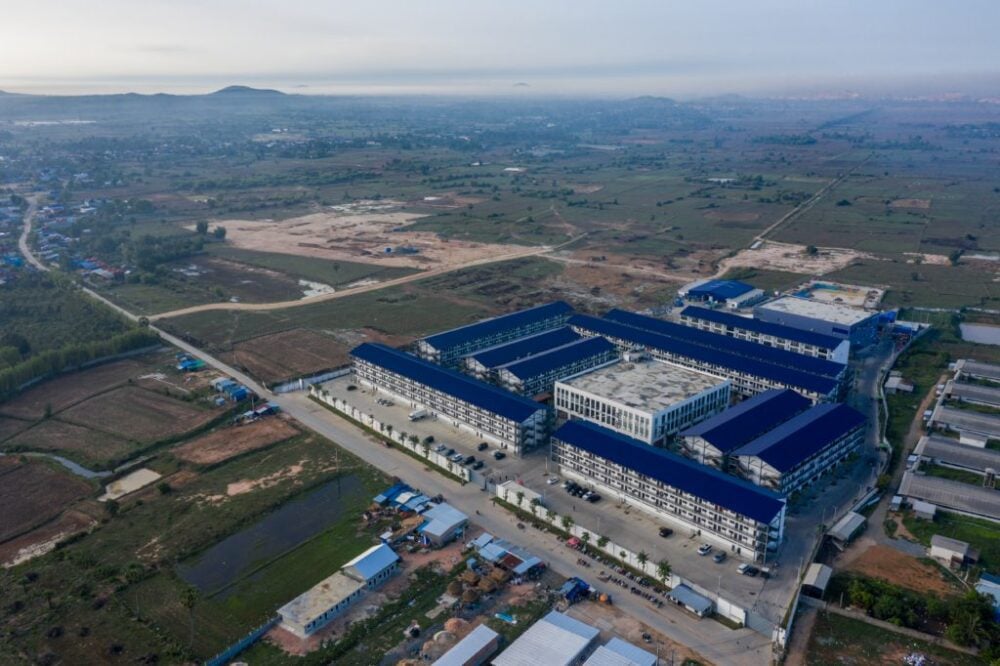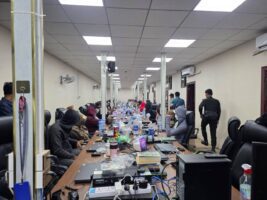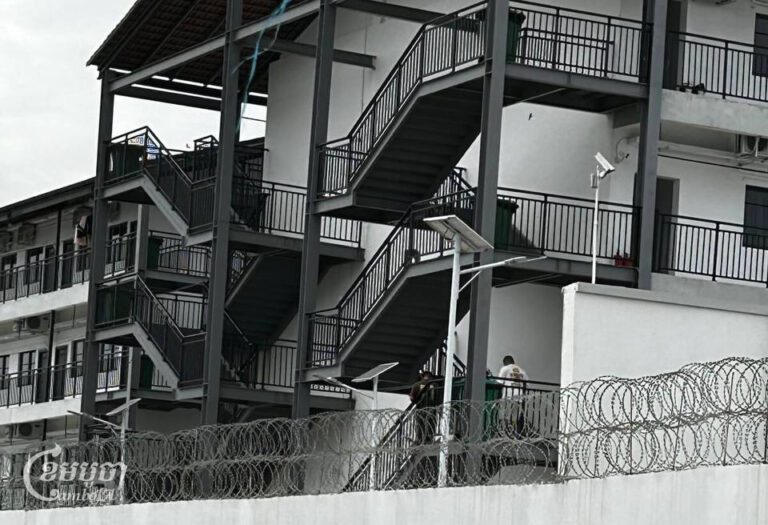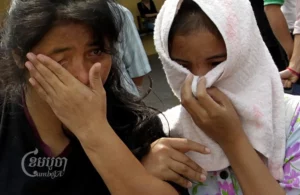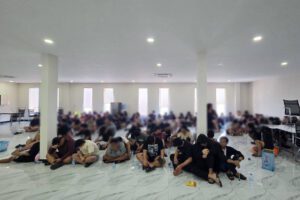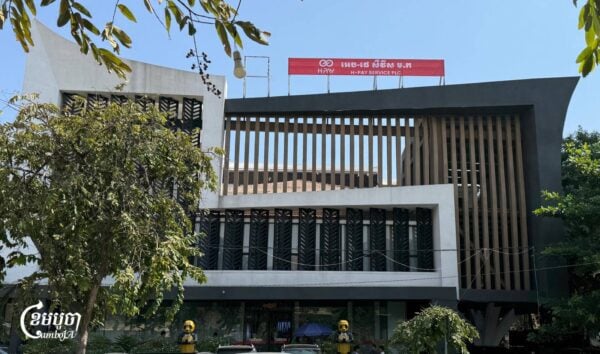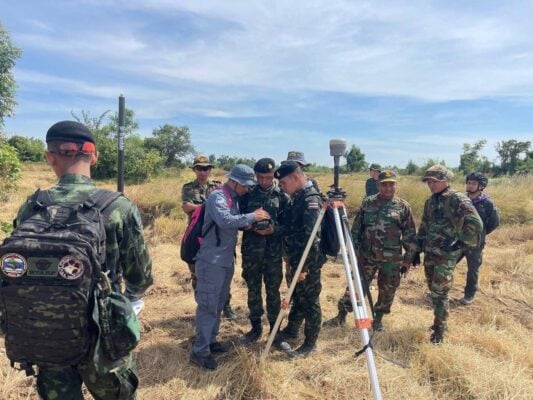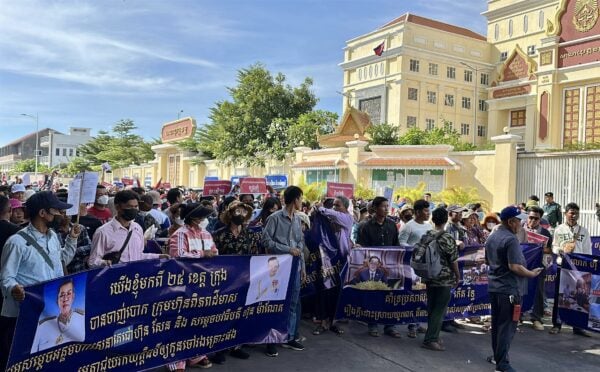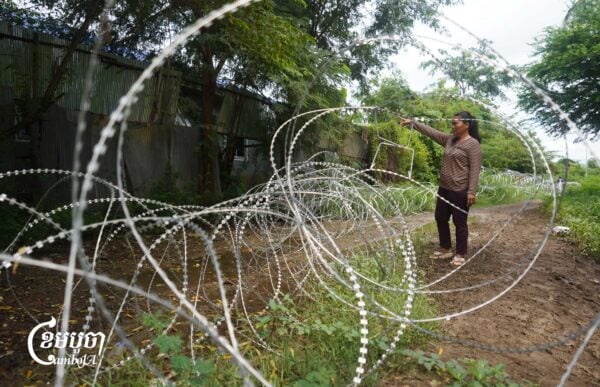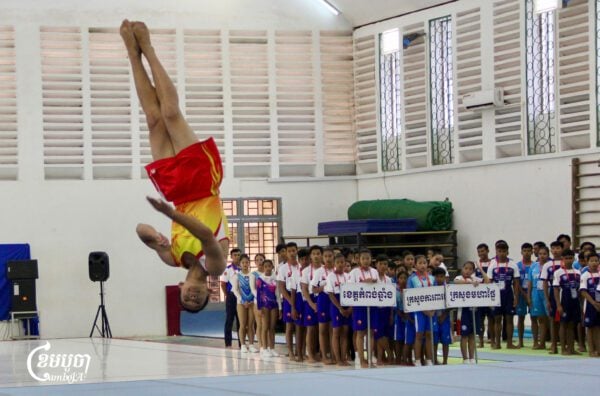Amnesty International accused the Cambodian government of deliberately ignoring widespread human rights abuses—including human trafficking, forced labor, child labor, slavery, and torture—carried out in more than 50 scamming compounds across the country.
Titled “I Was Someone Else’s Property: Slavery, Human Trafficking and Torture in Cambodia’s Scamming Compounds,” the report by Amnesty International was launched on Thursday at the Foreign Correspondents Club of Thailand in Bangkok, where Montse Ferrer, Amnesty International’s regional research director, presented the main findings of the report.
Based on 18 months of research, Amnesty visited more than 50 compounds in 16 Cambodian towns, and interviewed 58 survivors from eight countries—including nine children—as well as reviewed accounts from another 336 victims. The organization also interviewed 10 international and national organizations, and spoke to over 20 witnesses, including guards, taxi drivers, and local residents.
The report reveals violent and sprawling criminal operations run mostly by Chinese-led networks and, in many cases, carried out with the knowledge—or potentially, complicity—of Cambodian authorities.
“Why is this happening in Cambodia? It’s clear that it’s happening because the Cambodian government is allowing it to happen,” Ferrer said during the launch event.
“Cambodia has absolute sovereignty and control over its territory, and so if it’s allowing it to happen, the fair conclusion…is that they are benefiting in some way.”
Pen Bona, government spokesperson, declined to comment and referred CamboJA News to Touch Sokhak, spokesperson of the Ministry of Interior.
In response to Amnesty International’s report, Interior Ministry spokesperson Touch Sokhak acknowledged that online scams are existent in Cambodia, but the report overlooked the government’s efforts to crack down on such crimes, leading to international misunderstanding.
“We do not completely deny that there is no crime, but we cannot accept it completely either,” he said. “This report contains some truth, and there are some negatives that should be clarified more clearly, and if possible, [Amnesty International] should cooperate with the government of Cambodia. We welcome it. We can cooperate.”
He said the government has never allowed criminal groups to operate and is committed to cracking down on online scam. The presence of tall buildings, cameras, and fences do not necessarily indicate illegal activity, as many are used by legitimate companies for security reasons.
“I appreciate and accept the report’s recommendations, which urge all countries to work together to prevent online scam,” he added. “It is a good thing, and it is something that Cambodia wants to see in the region, the community, and the world as a whole because it is a global crime.”
The National Committee to Combat Human Trafficking claimed that it was responding to requests for help, but detailed a reactive response, claiming it could not investigate compounds without approval from other government entities.
Anatomy of Scam Compounds
Amnesty’s report identified 53 scamming compounds across 13 different areas in Cambodia– mostly borderlands and coasts – as well as 45 “suspicious locations” that authors suspect to host scamming activities. The Cambodia Counter Trafficking in Persons Project previously estimated at least 350 scam compounds are operating nationwide as of October 2024, exploiting an estimated 150,000 foreign workers.
According to this report, victims often were lured to Cambodia by fake job ads on platforms like Facebook and Instagram, then forced to run online scams—including fake romances, bogus investments, and other forms of fraud. Almost all workers surveyed for this study report some form of detention or restrained movement while working in the scam compounds – and a significant portion report violence in the compounds as well.
Forty of the 58 survivors interviewed for the Amnesty report claimed they experienced torture or abuse, often in so-called “dark rooms” used to punish those who failed to meet targets or tried to contact authorities. Survivors also spoke of deaths inside or near the compounds; Amnesty confirmed the death of a Chinese child in one facility.
One victim profiled in the report alleged their peer was beaten by guards for 20 or 30 minutes: “Yeah, it’s really inhuman… They just keep beating [the Vietnamese person] until their body was like the purple. Ten of them, or eight of them… and then using the, how to say that? Like dumbbell, dumbbell. Yeah, to hit his leg or something like that or hit his body or something. And then the electric baton, like, keep shocking. Hold on the body, yeah.” The survivor who told this story came from a compound that Amnesty identified as SI35, but overlaps with a Sihanoukville casino called DV Venice International that is registered with the Ministry of Commerce.
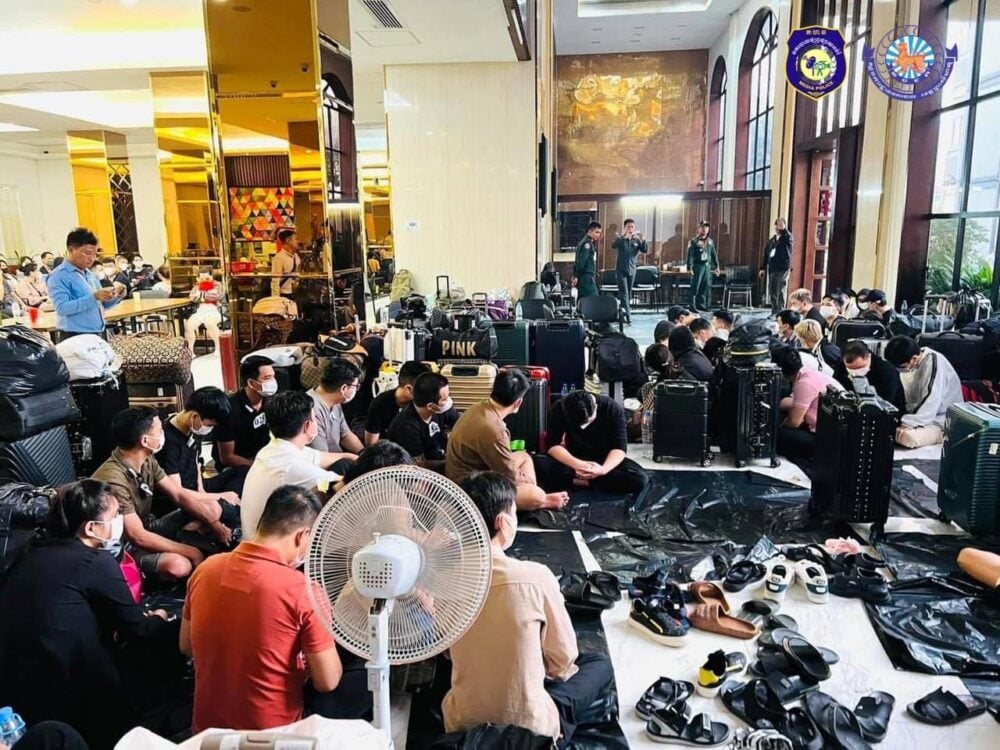
Amnesty found that all scamming compounds were heavily secured and designed to prevent escape, with fenced perimeters, barbed or razor wire, surveillance cameras, and armed guards—some carrying electric shock batons or firearms. Survivors said escape was impossible, and access was tightly controlled by guarded gates and barriers.
They also observed or received reports of electric fencing at three compounds, in Kandal’s Sampov Poun city, Koh Kong’s Botum Sakor district, and Svay Rieng’s Bavet city.
Reactive Response
Amnesty International’s Secretary General, Agnes Callamard, stated in the press release that survivors of the scamming compounds reported feeling deceived, trafficked, and enslaved to work in criminal enterprises that appeared to operate with the consent of the Cambodian government.
“Amnesty’s research reveals the horrifying magnitude of a crisis the Cambodian authorities are not doing enough to stop. Their failures have emboldened a criminal network whose tentacles extend internationally, with millions of people impacted by the scams,” he said.
They found that authorities interventions typically involved rescuing only one or a small number of individuals, and only in response to a request for help. These operations were often controlled by compound managers, with police collecting victims at the gate without entering or investigating, allowing the compounds to continue operating.
Chou Bun Eng, Vice President of the Interior Ministry’s National Committee to Combat Human Trafficking, told CamboJA News that she had not yet seen the report but explained that the government’s anti-trafficking operations are based on intervention requests from self-reporting victims. She added that the NCCT cannot investigate a site without a formal complaint and authorization from the prosecutor.
“If there is a request for intervention, we contact the victim to come out. After they’re brought out, it depends on their testimony about what happened inside before we can investigate further,” she said on Thursday, adding that some centers have already been shut down.
Between 2024 and early 2025, Cambodian authorities received 3,553 intervention requests involving 6,584 foreigners from 33 nationalities, the NCCT stated in a response to the Amnesty report dated May 26. 335 requests could not be located while 1,456 requests were deemed irregular due to missing key information. Authorities say investigations into these cases are ongoing.
NCCT said they located 1,762 of those requests, but only named 13 cases as incidents of human trafficking with 81 foreigners identified as victims – or about 2.7% of the 3,008 foreigners who the government could locate in that period.
Authorities also reported crackdowns on 28 locations during that period, locating 5,340 foreigners from 21 nationalities, with 19 cases forwarded to court. NCCT added that authorities arrested a total 92 “ringleaders and accomplices” from those raids across 6 nationalities: China, India, Indonesia, Myanmar, Thailand and Vietnam.
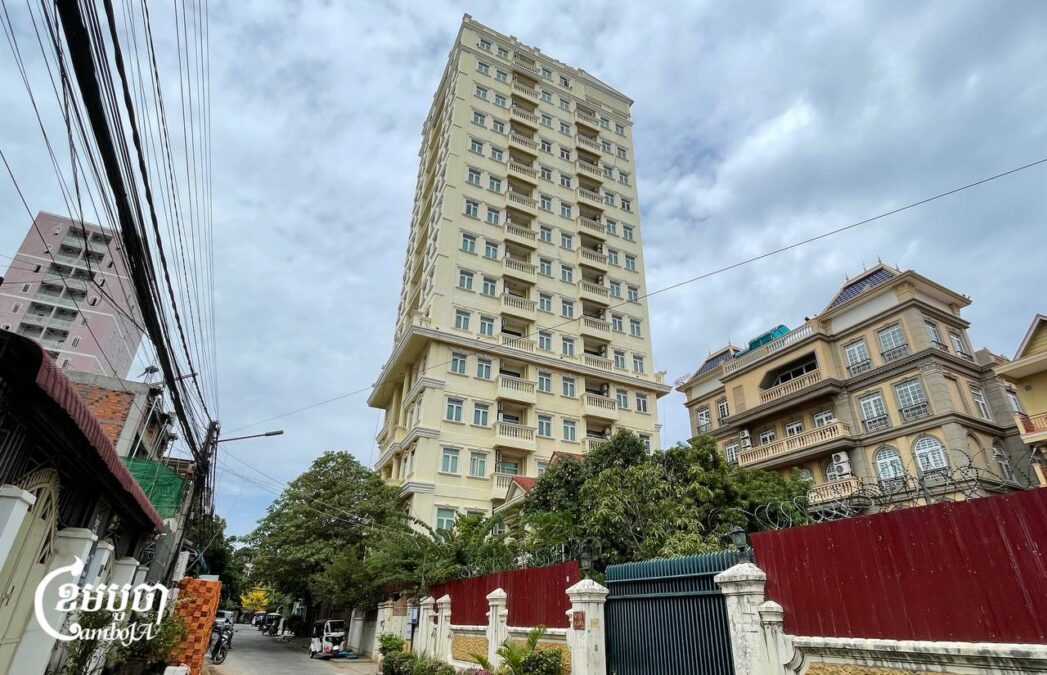
However, Amnesty noted that after sharing the list of suspicious compounds with the Cambodian government on May 12, 2025, the NCCT did not acknowledge the list nor commit to using it for further investigation. Of the 53 scamming compounds identified by Amnesty, they counted only two compounds shut down after state intervention, while 13 of the compounds appear to have never been subject to raids or rescues by authorities.
Ferrer also raised questions with the NCCT’s hotline and Facebook page as a method of requesting help, noting that victims don’t always have access to Facebook.
“They’ve admitted they don’t proactively investigate—only reacting when a complaint is made,” she said. “We recommend the government adopt a more proactive approach to identify and investigate these sites.”
The report alleges that survivor accounts from across Cambodia point to widespread collusion and corruption, suggesting authorities were aware of the abuses but failed to act—violating their obligations under international law.
The report did not directly name individuals, officials or companies that may be complicit in the operation of the identified scam compounds, but Ferrer said the organization would continue to investigate these potential links.
Last month, a report by U.S. researcher Jacob Sims—who says he was threatened for speaking out about the cyber scam industry in 2023 and cannot return to Cambodia —sparked backlash from Cambodian officials after urging more U.S. Treasury Department sanctions on 28 officials and elites tied to the online scam industry. The Ministry of Interior condemned the report as “politically motivated and baseless.”
In its response to Amnesty included in the report, the NCCT stated that it had taken “drastic measures” to crack down on scams and trafficking. It said authorities acted quickly when individuals requested help—often in coordination with compound owners—and conducted interviews to assess whether the person was a trafficking victim under the Palermo Protocol, an agreement to address and prevent human trafficking and child trafficking adopted by the U.N. General Assembly in 2020.
Amnesty International urges the Cambodian government to take immediate action to investigate all compounds and prosecute officials complicit in trafficking and corruption. It also calls for proper support for victims and a ban on electric shock weapons used by law enforcement.
Amnesty further recommends that countries whose nationals are trafficked to Cambodia—such as China and ASEAN members—strengthen their legal frameworks and ensure their embassies can support victims. Other countries are encouraged to pressure Cambodia to act and hold traffickers accountable for crimes such as enslavement and torture.
Last month, UN experts raised alarm over the cyber scam industry as a growing humanitarian crisis in Southeast Asia, calling for urgent, rights-based action to dismantle scam compounds where hundreds of thousands are “trafficked, trapped, and forced into online criminal operations”—mostly in Myanmar, Laos, Cambodia, the Philippines, and Malaysia.
This week, UN special rapporteurs sent a letter to the Thai government, demanding clarification on its role in tackling cross-border trafficking, noting Thailand’s key role as a transit hub for victims and a supplier of services including electricity, communications network connectivity and financial links.
Note: This story was updated on Friday at 9:55 a.m after receiving the response from Interior Ministry spokesperson Touch Sokhak.

